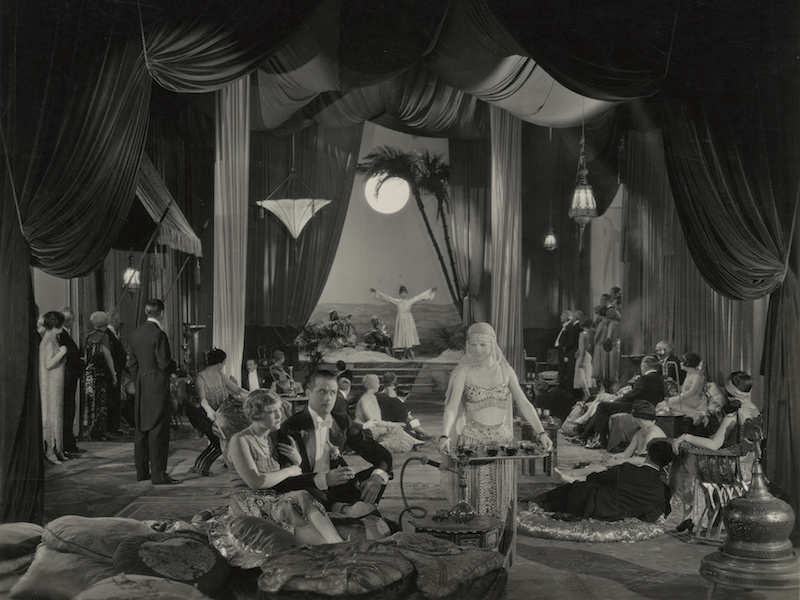SKINNER’S DRESS SUIT
William A. Seiter (US 1926)
The Skinner character first appeared in 1916, in a short story by Henry Irving Dodge, and was brought to the screen by Essanay in 1917, when Bryant Washburn starred in a trio of films in one year, Skinner’s Dress Suit, Skinner’s Bubble and Skinner’s Baby, all directed by Harry Beaumont and all now believed lost. Universal bought the rights in 1925, slightly earlier than What Happened to Jones, correctly knowing both vehicles would be perfect for their star, paired again with Laura La Plante, Denny’s acknowledged favorite leading lady and herself on the cusp of stardom. Reg plays Skinner, an underpaid cashier who lies to his wife Honey (La Plante) and tells her he got a raise. Honey excitedly buys her husband an expensive formal suit, yet once he puts it on he’s faced with a multitude of problems, including losing his job. Before he can tell Honey the bad news, she whisks him off to a society dance at a hotel where one of his most important clients is staying. By the end of the evening, Skinner in his new suit has closed a half-a-million-dollar deal, winning a partnership in his old company.
In one of the party scenes, Skinner and Honey teach a group of dignified society folk a new dance step; Reg reportedly sprang a surprise on-set and made up his own dance, which he called “The Savannah Shuffle,” telling his students that it was combination of the Charleston and the earlier Gaby Glide, interspersed with a waddling walk. Everyone had a ball learning the steps and, during the gay party, Bill Seiter proposed to La Plante, making it a real celebration. While the cast was dancing away, Will Hays came for a visit to the studio for a routine tour inspection. As Universal’s top star and studio ambassador, Reg played guide and gave the “Czar of the Movies” a personal tour, even teaching Hays how to do the “Savannah Shuffle” and showing him that Skinner’s Dress Suit was good, clean family fun.
On release of the picture, the press and exhibitors once again raved. The Chicago Tribune wrote, “Haven’t seen so much joy unrestrained in a movie theater for a long time… Reginald Denny has never had a better role than that of Skinner and never a better actress or more appealing vis-à-vis than that of Laura La Plante.” The San Francisco News reported, “Reginald Denny is decidedly in his element as Skinner. He gets out every ounce of fun there is in a role of the harassed young husband and the situations which he finds himself.” Reg’s dance became the new craze; Universal Weekly featured a story with instructions on how to do the dance, proclaiming “Now all Hollywood is doing the Savannah Shuffle!” Reg and La Plante had now taken the throne as the “King and Queen of Comedy”: Denny would have three more films released in 1926, making a total of five, only slightly easing up the brutal schedule in the coming years.
Skinner’s tremendous success must have riled Bryant Washburn, as he returned to the role that had made him famous eleven years earlier, with a sequel of sorts, Skinner’s Big Idea, made by FBO Pictures in 1928; reviews were not good. With the coming of sound, Universal sought to again cash in on the property with a remake of Skinner’s Dress Suit, now called Skinner Steps Out, starring Glenn Tryon (E. J. Ratcliffe returned to the cast, but this time played Mr. Jackson).
Kimberly Pucci


regia/dir: William A. Seiter.
scen: Rex Taylor, dal racconto di/based on a short story by Henry Irving Dodge (The Saturday Evening Post, 23.09.1916).
did/titles: Walter Anthony.
photog: Arthur Todd.
mont/ed: John Rawlins.
scg/des: Leo E. Kuter.
asst dir: Nate Watt.
ed. supv: Maurice Pivar.
cast: Reginald Denny (Skinner), Laura La Plante (Honey Skinner), Ben Hendricks Jr. (Perkins), E. J. Ratcliffe (Mr. McLaughlin), Arthur Lake (Tommy), Hedda Hopper (Mrs. Colby), Lionel Braham (Mr. Jackson), Betty Morrissey (Miss Smith), Henry A. Barrows (Mr. Colby), William H. Strauss (sarto/tailor), Lila Leslie (Mrs. Wilton), Broderick O’Farrell (Mr. Wilton), Lucille Ward (Mrs. Jackson), Lucille De Nevier (Mrs. Crawford), Frona Hale (Mrs. McLaughlin); comparse/extras: Minta Durfee, Adolph Faylauer, Betsy Lee, Grady Sutton, Ellinor Vanderveer.
prod: Carl Laemmle, William A. Seiter, Universal-Jewel.
dist: Universal.
uscita/rel: 18.04.1926 (copyright 22.01.1926).
copia/copy: DCP, 75′; did./titles: ENG.
fonte/source: NBCUniversal.




